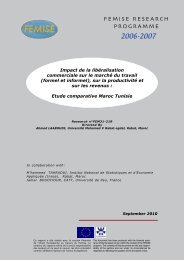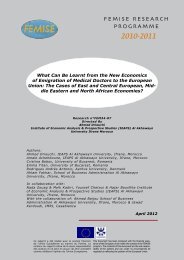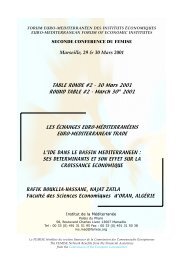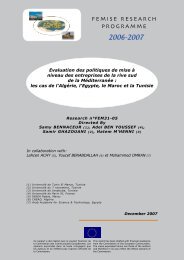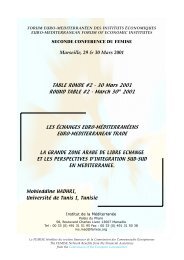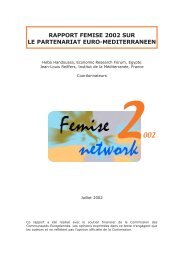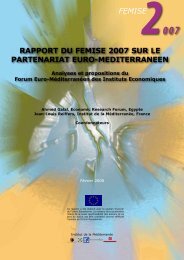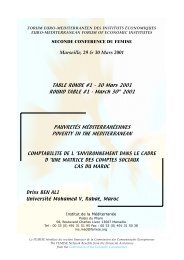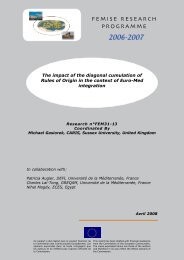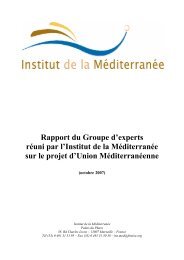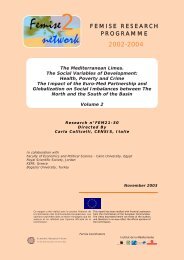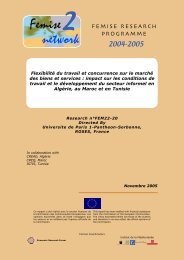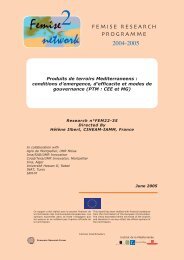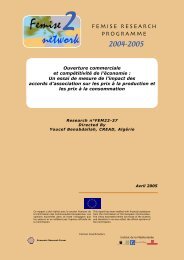PDF, FR, 219 p., 3,1 Mo - Femise
PDF, FR, 219 p., 3,1 Mo - Femise
PDF, FR, 219 p., 3,1 Mo - Femise
You also want an ePaper? Increase the reach of your titles
YUMPU automatically turns print PDFs into web optimized ePapers that Google loves.
Executive Summary<br />
This study is motivated by the poor accumulation of physical capital in the Maghreb countries,<br />
the low levels of national savings and the inability to overcome this weakness through Foreign<br />
Direct Investment (FDI). These factors have caused the necessity to find other sources for<br />
growth. Thus, it is very important to develop an educational and training strategy to build human<br />
capital and to address the needs of these economies. By improving the skills, shaping<br />
competencies, developing efficacy and mobility of the labor, education will certainly contribute to<br />
the enhancement of the Total Factor Productivity (PTF).<br />
In this context, the main objective of the study is to evaluate the pace, the quality and nature of<br />
the integration of the professional training graduates in the economies of Tunisia and <strong>Mo</strong>rocco.<br />
This study is structured around five chapters:<br />
Chapter 1 is dedicated to an in-depth analysis of professional training in <strong>Mo</strong>rocco. It puts<br />
emphasis on the public policies and the reforms initiated in the eighties. After a historical<br />
reminder on the genesis of professional training, Mr. Driss EL YACOUBI shows that this later<br />
contributed, not only, to the improvement of the qualification rate of the persons who reach the<br />
job market, but it also widely facilitated the linkages of the educational system with its economic<br />
environment. However, in spite of this progress there are still needs of restructurings and the<br />
strengthening the professional training instrument<br />
Chapter 2 proposes a national development strategy and the requirements to review the<br />
professional Training – Qualification instrument in <strong>Mo</strong>rocco. Having detailed the various phases<br />
of the development of <strong>Mo</strong>rocco and the reforms organized by the <strong>Mo</strong>roccan authorities in the<br />
various branches of industry, Mr. <strong>Mo</strong>hamed ELMERGHADI quantifies the sector-based needs<br />
in professional training in connection with the emergence of new professions. After the success -<br />
with mixed results, so far -, of macroeconomic reforms in <strong>Mo</strong>rocco since its independence, the<br />
country is ready today to face the competition which dictated the opening in which <strong>Mo</strong>rocco has<br />
widely adopted, with an increased emphasis on educational system.<br />
Chapter 3 offers an analysis of institutional aspects of professional training in Tunisia. Mr. Jamal<br />
BOUOIYOUR describes briefly the genesis of this system and pointed out that Tunisia in spite<br />
of remarkable progress, suffers from some problems related to the low and partial integration of<br />
the professional training system in the general system of training. We find this phenomenon in<br />
<strong>Mo</strong>rocco also. In a more precise way, the implement of professional training turns out incapable<br />
2



